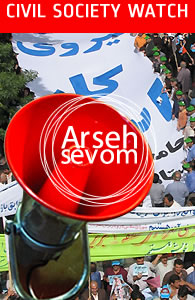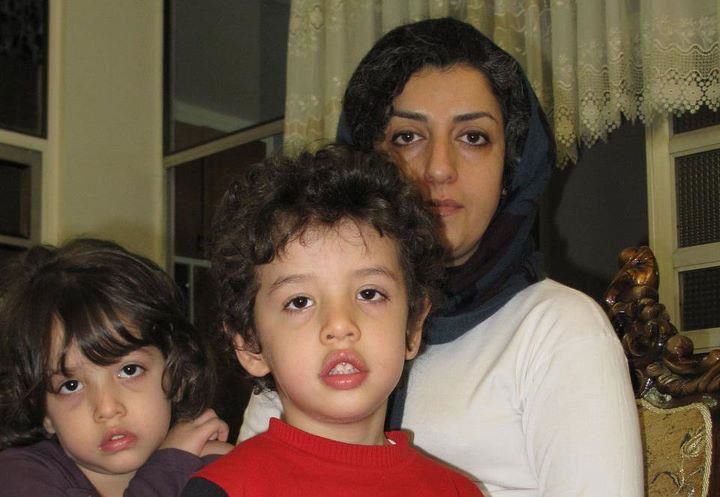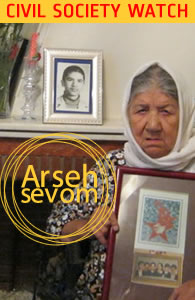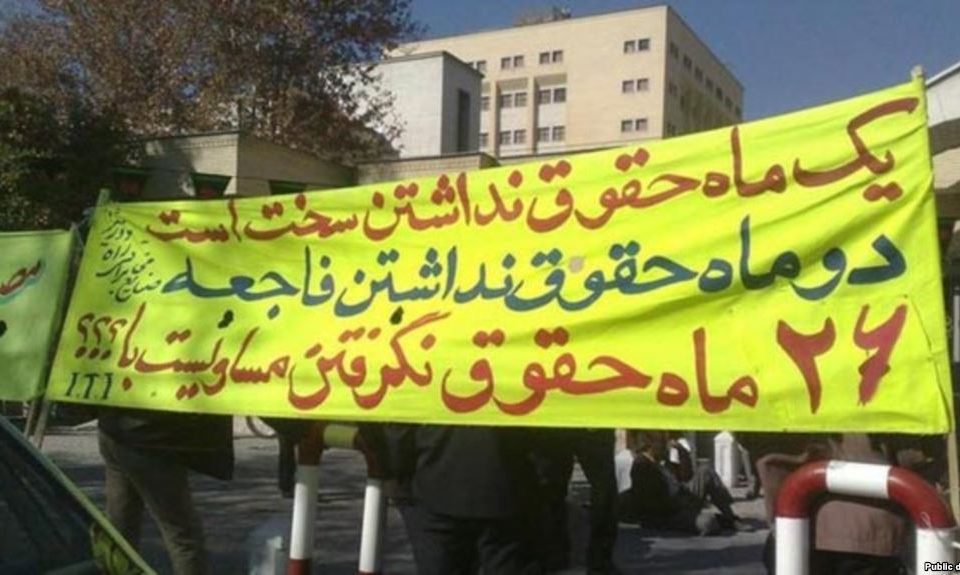
Iran’s National Internet Project: Keepin’ It Clean With Censorship
April 19, 2012
Worker’s Day Denied, Campaign to Free Jailed Students, Park Rangers Threatened
May 1, 2012Arseh Sevom — It was hard not to be concerned over the state of civil society in Iran last week with the arrest of human rights defender Narges Mohammadi, the sentencing of Mansoureh Behkish who is a member of the Mourning Mothers, and the ongoing battle against free speech and free information. The one positive story was the rights workshops for children caught up in the juvenile detention system in Tehran.
“Don’t let my brother die. Not again!”
“Imagine how my mother must be feeling — after the loss of her first son to the prisons of the Islamic republic just over a year ago, then mourning the death of her daughter — on the day we went to Evin prison to tell my second brother, Hamid Ghassemi, that an official had told us his death sentence had been confirmed,” Parvin Ghassemi told exiled journalist, Masih Alinejad. “They based [my brother’s] death sentence on a questionable email print-out.”
In 2008, Captain Alborz Ghassemi was arrested on espionage charges. Hamid Ghassemi — who is a Canadian citizen — was visiting Iran at the time to see family. He followed up on the arrest of his brother, visiting military intelligence several times, before being arrested himself on the same charges. According to Kalameh (in translation), evidence in the case of both was fabricated. The captain died in prison.
Ghassemi’s sister said judicial authorities did not notify her brother’s lawyer of the verdict before informing the family at Evin prison.
The Battle Over Humanities
Ayatollah Khamenei, the Supreme Leader, has repeatedly expressed his discontent with the spread of such “Western disciplines.” This past week the higher education minister, Kamran Daneshjoo, echoed those views attacking the humanities for “corrupting morals and destroying social values.”
“Sorry! Your Field is Saturated.”
Tehran’s daily newspaper, Jamejam, reported that the head of the Supervisory Bureau of the Ministry of Science Research and Technology, Mohammad Reza Ameri, announced that, “according to higher education planning the share of students studying humanities and social sciences must be decreased to 36%, […] since many of these fields have now reached the saturation level.”
According to the same report, 45% of university students are now enrolled in the humanities and social sciences.
“Illegal” Books Turned into Paste in Qom
In related developments, the Ministry of Guidance and Islamic Culture announced that 6,386 “illegal” books were discovered and turned into paste in Qom. Qom is a center for clerical studies, a pilgrimage city, and a center for printing presses. The books turned to paste had been printed without official authorization. For more on the pressure on publishers, click here.
Nine Dead Per Day
According to a recent report by the Iranian forensic medicine organization a total of 3,593 lost their lives to drug abuse during the last Iranian year: nearly 10 people per day. The report adds that this represents a 1.7 percent decrease when compared with the previous year.
Activist Arrested on the Charge of “Membership in a Human Rights Group”

Narges Mohamadi, activist and deputy chair of Iran’s Defenders of Human Rights Center, was arrested on charges of “gathering information and colluding against national security, membership in the Defenders of Human Rights Center, and acts of propaganda against the Islamic Republic”.
Narges Mohamadi’s husband, who had been a prisoner of conscience himself, was forced to leave the country. The imprisonment of Ms. Mohamadi leaves her two children without either parent at home.
Defenders of Human Rights Center – where Narges Mohamadi worked– was founded the Nobel Laureate, Shirin Ebadi.
Movin’ Out
Quds Online has posted the news of a property boom in neighboring Turkey fueled by Iranian buyers. Many Iranians are becoming wary of purchasing new homes inside Iran. According to Arseh Sevom sources in Iran, many are worried about “economic instability and the imminence of a war.” One businessman interviewed added, “It is not only Turkey, we are also checking out other places such as Armenia.”
Children in Juvenile Detention Learn Their Rights
Unicef reports on workshops held in Tehran’s Juvenile Correction and Rehabilitation Center designed to help children combat violence against them and understand and advocate for their rights. Through role-playing and discussion the children learn to deal with many of issues such as improper sexual advances in the workplace, child labor, and abusive family members.
The workshops, which are the result of the UN Secretary General’s 2006 report on violence against children, are led by peers rather than adult experts. Unicef reports:
“It makes a lot of difference when the trainer is a peer rather than an adult expert from outside,” said Zahara, the teen facilitator. ”When the girls see that someone like them – who has experienced living in the center – is training them on violence, they feel more comfortable talking about their experiences.”
International Tribunal, Mourning Mothers
Mansoureh Behkish, a supporter of the Mourning Mothers, was recently sentenced to 4.5 years in prison for “propaganda against the regime” and endangering “national security.” Her crime? Visiting the graves of loved ones. She told the International Campaign for Human Rights in Iran:
“I did not do anything illegal. I told my interrogators, too, that everyone is entitled to go to the grave site of whomever he or she chooses and the law has not set any limitations on this activity. It is my minimum citizenship right to choose whose grave I would visit, and I will not give up my minimum right. They know themselves that what I do is not against the law, but, unfortunately, they build cases against individuals in Iran,”
The graves Behkish was visiting were those of her sister and brothers, executed during the 1980s. In this video from December 2011, her 91-year old mother testifies about the executions (four sons, one son-in-law, and four sons). She asks why they were executed? Why hasn’t the UN done anything? Why has the UN not spoken out about the executions of her children? “We are Muslims. They are Muslims. If Muslims abuse us this much… then…?”
This testimony is now part of the “Iran Tribunal,” which is acting to bring attention to the mass executions of the 1980s. They plan to hold “court hearings” this coming June.
During the 1980s 20,000 dissidents disappeared in Iran. Five thousand of those 20,000 have been confirmed executed.
ICT Calls for Outsourcing to “Localize” the Internet
Last week, Arseh Sevom reported on Iran’s national internet project with recommendations. In the recent move toward its implementation and eventual launch, the Iranian Ministry of ICT called for domestic specialists to submit their applications for participation in “localizing telecommunication technologies”. The deadline for submission of applications was 19th of April and they are supposedly reviewing the applications at the ICT to recruit new human sources.
For further information on this story, see this post from the Electronic Frontier Foundation.
Sweep of Arrests in Khuzestan and PressTV is There
Human Rights Watch has reported on the arrests of Arab activists in Khuzestan over the past year. Many remain held without charge. Now Justice for Iran reports that PressTV, Iran’s English language television channel, has presented the arrested individuals as terrorists. The families of the detainees do not even know where they are being held, their right to legal council has been denied, and PressTV is flouting Iranian libel law by acting as judge, jury, and executioner.
Journalist Maziar Bahari, who was held in prison in Iran for 100 days in 2009, reported that PressTV journalists were present during his interrogations.
Dead Tiger or Live Cheetah, That is the Question
The story of reviving the Iranian Mazandarani or Caspian tigers (Panthera tigris virgata) has caused controversy in Iran. MPs have voiced concerns over environmental stewardship and the welfare of any tigers successfully born from this experiment. In a similar attempt the male of two tigers imported to Iran from Russia died eight months after arrival in 2010.
Some environmentalists say that instead of trying to resurrect a breed that is extinct, we must focus on preserving the alarmingly-few Iranian cheetahs (Acinonyx jubatus venaticu) still alive.
In 2010, Russia exchanged a pair of tigers for a pair of Iranian cheetahs. Let’s hope this time things go better – and not only for the tigers.
Dogs Under Arrest
In more animal news, the Iranian police have been arresting dogs again. Many clerics have called pet dogs “un-Islamic,” focusing on short-legged dogs in particular since they are not working animals.
Fred Petrossian writes on Global Voices:
“Iran’s government considers keeping pet dogs un-Islamic, but has mostly tolerated it. It is possible that because the people most likely to keep dogs are Iran’s urban and educated youth, dogs may be generating more official hostility again.”






